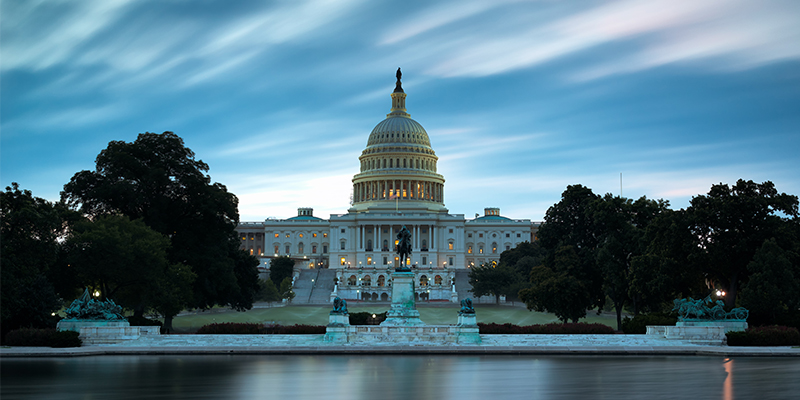The long-awaited runoffs for Georgia’s Senate seats concluded yesterday, with Democrats poised to win control of the Senate. Raphael Warnock was declared the winner in his contest against incumbent Republican incumbent Kelly Loeffler, reducing the Republican margin in the Senate to 50-49. As of Wednesday morning, Democrat Jon Ossoff led his incumbent Republican opponent, David Purdue, by a smaller margin than Warnock’s lead over Loeffler, resulting in the race not yet having been called. Nevertheless, election observers are expecting Ossoff to maintain his lead as the outstanding votes are counted, resulting in a 50-50 Senate tie.
The vice president under the U.S. Constitution casts a tie-breaking vote in the Senate. And while that means Kamala Harris will vote with Senate Democrats to make New York Senator Chuck Schumer Majority Leader, and elevate Democrats to the chairmanships of Senate committees, the dynamics of a closely divided Senate and House make passing partisan sweeping legislation difficult and unlikely. With a 50-50 Senate, each vote is indispensable for Democrats if they want to roll a united Republican opposition.
And while Democrats in the progressive wing of the party have called for ending the filibuster in the Senate (which requires 60 votes for a bill to advance), West Virginia Democratic Senator Joe Manchin has already declared he would vote against such a move. So in all likelihood, Democrats will need some Republican support to pass legislation.
Of course, sweeping partisan legislation has been passed with narrow majorities using the budget reconciliation process, with President Barack Obama’s Affordable Care Act, and most recently, the Republican Tax Cuts and Jobs Act, being prime examples. A bill moving under budget reconciliation requires only a simple majority to pass the Senate, avoiding the 60-vote filibuster barrier. However, current political dynamics would argue against that process being used to push a highly partisan bill.
As some observers have noted, politics in American has become a four-way struggle, with Republicans and Democrats having their own internal factions to manage. Those on the ideological extremes of both parties will demand a certain adherence to their preferred policies, shunning the sort of deal-making needed to pass legislation. In this scenario, the most likely outcomes are either gridlock, which many are predicting, or that the centrists of both parties are empowered to lose some of their more extreme members and move legislation with bipartisan support.
While this idea of bipartisan legislation moving forward may seem a tad optimistic in the wake of our recent history, it may not be far-fetched. While Republicans may have lost the presidency, Democrats lost seats in the House – an outcome they did not expect. Obama suffered the largest mid-term losses in the House since the Great Depression, and Republicans lost their majorities after using reconciliation to pass their tax bill. Centrist Democrats in the House see the writing on the wall regarding 2022, and will not want to be sacrificed on the altar of progressive purity.
For their part, Senate Republicans will have more seats up for re-election than Democrats in 2022. Conventional wisdom has been that these incumbents were more afraid of a primary challenger from the right backed by President Donald Trump, with less fear of a general election loss. However, the runoff results in the Georgia, a traditionally Republican state, may cause some recalibration of that political calculus. Legislative achievements rather than ideological purity becomes more relevant to their re-election.
What does this mean for those issues important to NAIOP members? While gridlock and incremental change are the most likely scenarios over the near term, this does not mean that the commercial real estate industry is not at risk. The tax agenda of President-elect Joe Biden’s administration, for example, would raise capital gains taxes, eliminate Section 1031 like-kind exchanges, raise corporate tax rates, eliminate capital gains treatment for real-estate carried interests, and increase leasehold improvement depreciation schedules from 15 to39 years. Some of these real-estate specific provisions fly under the radar screen of the general public and could be included as “payfors” in major legislation that has bipartisan support, such as infrastructure bills or other popular measures. Ensuring that policymakers understand the importance of these to the economic health of commercial real estate, and their communities, will be an imperative.
Similarly, while progressive proposals constituting a “Green New Deal” will not pass muster with Senate Republicans (and a few Senate Democrats for that matter), President Biden is sure to pursue an aggressive legislative “climate change” agenda which will have to depend more on incentives. The industry must remain engaged on that front so that “green building” measures designed to increase energy efficiency in commercial building are achievable and incentive-based.








